
William Clark Gable was an American film actor. Often referred to as the "King of Hollywood", he had roles in more than 60 motion pictures in a variety of genres during a career that lasted 37 years, three decades of which was as a leading man. He was named the seventh greatest male movie star of classic American cinema by the American Film Institute.

A Free Soul is a 1931 American pre-Code drama film that tells the story of an alcoholic San Francisco defense attorney who must defend his daughter's ex-boyfriend on a charge of murdering the mobster she had started a relationship with, who he had previously gotten an acquittal for on a murder charge. Directed by Clarence Brown it stars Norma Shearer, Leslie Howard, Lionel Barrymore, and Clark Gable.

Goldwyn Pictures Corporation was an American motion picture production company that operated from 1916 to 1924 when it was merged with two other production companies to form the major studio, Metro-Goldwyn-Mayer. It was founded on November 19, 1916, by Samuel Goldfish, an executive at Lasky's Feature Play Company, and Broadway producer brothers Edgar and Archibald Selwyn, using an amalgamation of both last names to name the company.

Manhattan Melodrama is a 1934 American pre-Code crime film, produced by MGM, directed by W. S. Van Dyke, and starring Clark Gable, William Powell, and Myrna Loy. The movie also provided one of Mickey Rooney's earliest film roles. The film is based on a story by Arthur Caesar, who won the Academy Award for Best Original Story. It was also the first of Myrna Loy and William Powell's fourteen screen pairings.

Show People is a 1928 American synchronized sound comedy film directed by King Vidor. While the film has no audible dialog, it was released with a synchronized musical score with sound effects using both the sound-on-disc and sound-on-film process. The film was a starring vehicle for actress Marion Davies and actor William Haines and included notable cameo appearances by many of the film personalities of the day, including stars Charlie Chaplin, Douglas Fairbanks, William S. Hart and John Gilbert, and writer Elinor Glyn. Vidor also appears in a cameo as himself, as does Davies.
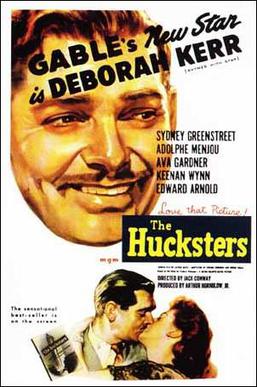
The Hucksters is a 1947 American comedy drama film directed by Jack Conway and starring Clark Gable and Deborah Kerr, her debut in an American film. The supporting cast includes Sydney Greenstreet, Adolphe Menjou, Ava Gardner, Keenan Wynn, and Edward Arnold. It was produced by Metro-Goldwyn-Mayer. The movie is based on the novel The Hucksters by Frederic Wakeman Sr., a skewering of the post-World War II radio advertising industry with Gable's character alternating in pursuit of Kerr and Gardner.
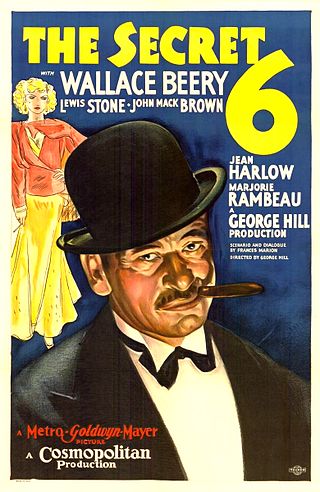
The Secret Six is a 1931 American pre-Code crime film starring Wallace Beery as "Slaughterhouse Scorpio", a character very loosely based on Al Capone, and featuring Lewis Stone, John Mack Brown, Jean Harlow, Clark Gable, Marjorie Rambeau and Ralph Bellamy. The film was written by Frances Marion and directed by George W. Hill for MGM.

Susan Lenox (Her Fall and Rise) is a 1931 American pre-Code Metro-Goldwyn-Mayer film directed and produced by Robert Z. Leonard and starring Greta Garbo and Clark Gable. The film is based on a novel by David Graham. It is the only screen pairing of Garbo and Gable, who did not like each other. The notoriety of the novel alone caused British censors to ban the film's release. Following several edits, it was finally approved in the UK with a new title, The Rise of Helga.

No Man of Her Own is a 1932 American pre-Code romantic comedy-drama film starring Clark Gable and Carole Lombard as a married couple in their only film together, several years before their own legendary marriage in real life. The film was directed by Wesley Ruggles, and originated as an adaptation of No Bed of Her Own, a 1931 novel by Val Lewton, but ended up based more on a story by Benjamin Glazer and Edmund Goulding, although it retained the title from Lewton's novel. It is not related to the 1950 film of the same name.
Laughing Sinners is a 1931 American pre-Code Metro-Goldwyn-Mayer feature film starring Joan Crawford and Clark Gable in a story about a cafe entertainer who experiences spiritual redemption. The dialogue by Martin Flavin was based upon the play Torch Song by Kenyon Nicholson. The film was directed by Harry Beaumont. Laughing Sinners was the second of eight cinematic collaborations between Crawford and Gable.
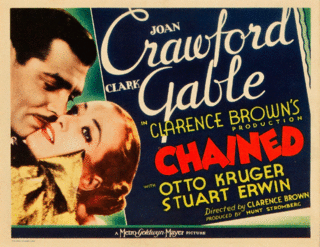
Chained is a 1934 American drama film directed by Clarence Brown and starring Joan Crawford and Clark Gable with supporting performances by Otto Kruger, Stuart Erwin, Una O'Connor and Akim Tamiroff. The screenplay was written by John Lee Mahin, Albert Hackett and Frances Goodrich based upon a story by Edgar Selwyn. Ward Bond and Mickey Rooney appear briefly in uncredited roles.

Saratoga is a 1937 American romantic comedy film starring Clark Gable and Jean Harlow and directed by Jack Conway. The screenplay was written by Anita Loos. Lionel Barrymore, Frank Morgan, Walter Pidgeon, and Una Merkel appear as featured players; Hattie McDaniel and Margaret Hamilton appear in support. It was the sixth and final film collaboration of Gable and Harlow.

Parnell is a 1937 American biographical film produced by Metro-Goldwyn-Mayer, starring Clark Gable as Charles Stewart Parnell, the famous Irish politician. It was Gable's least successful film and is generally considered his worst, and it is listed in The Fifty Worst Films of All Time. The movie addresses the sex scandal that destroyed Parnell's political career, but its treatment of the subject is highly sanitized in keeping with Hollywood content restrictions at the time.
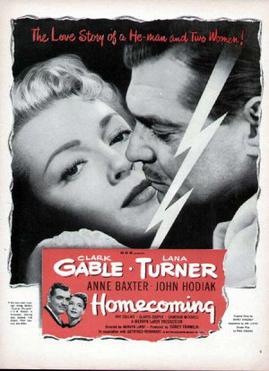
Homecoming is a 1948 American romantic drama film starring Clark Gable and Lana Turner. It was the third of their four films together, and like two of the others, was about a couple caught up in World War II.

The Boy Friend is a 1971 British musical comedy film written and directed by Ken Russell, based on the 1953 musical of the same name by Sandy Wilson. The film stars Twiggy, Christopher Gable, Tommy Tune, and Max Adrian, with an uncredited appearance by Glenda Jackson. Metro-Goldwyn-Mayer made extensive edits to the film for its American release. The missing material was restored and the film was re-released in 1987. The Boy Friend was released on DVD on 12 April 2011.
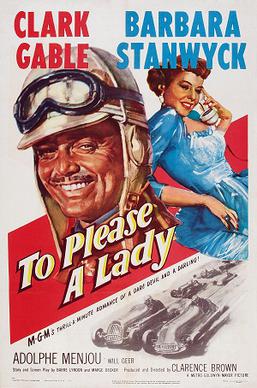
To Please a Lady is a 1950 American romance film produced and directed by Clarence Brown, and starring Clark Gable and Barbara Stanwyck. The climactic race scene was shot at the Indianapolis Motor Speedway.
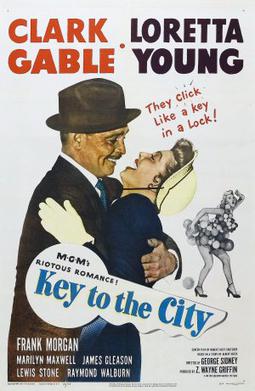
Key to the City is a 1950 American romantic comedy film starring Clark Gable and Loretta Young as mayors who meet in San Francisco, and despite their contrasting personalities and views, fall in love.
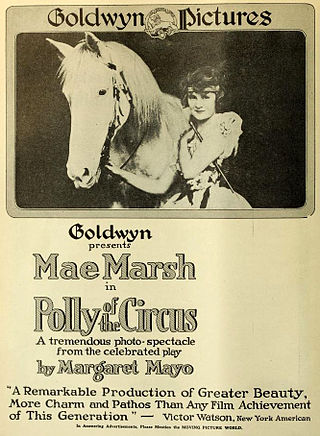
Polly of the Circus is a 1917 American silent drama film notable as the first film produced by Samuel Goldwyn after founding his studio Goldwyn Pictures. This film starred Mae Marsh, usually an actress for D.W. Griffith, but now under contract to Goldwyn for a series of films. The film was based on the 1907 Broadway play Polly of the Circus by Margaret Mayo which starred Mabel Taliaferro. Presumably when MGM remade Polly of the Circus in 1932 with Marion Davies, they still owned the screen rights inherited from the 1924 merger by Marcus Loew of the Metro, Goldwyn, and Louis B. Mayer studios. This film marks the first appearance of Slats, the lion mascot of Goldwyn Pictures and Metro-Goldwyn-Mayer. Prints and/or fragments were found in the Dawson Film Find in 1978.
Polly of the Circus may refer to:

Polly of the Circus was a 1907 Broadway play by Margaret Mayo which starred Mabel Taliaferro and was produced by Taliaferro's husband, Frederic Thompson. A circus girl/minister love story known for its drama and its spectacle staging, the cast also included Edith Taliaferro, Herbert Ayling, Joseph Brennan, Mattie Ferguson, John Findlay, Guy Nichols, Ida St. Leon and Malcolm Williams.


















